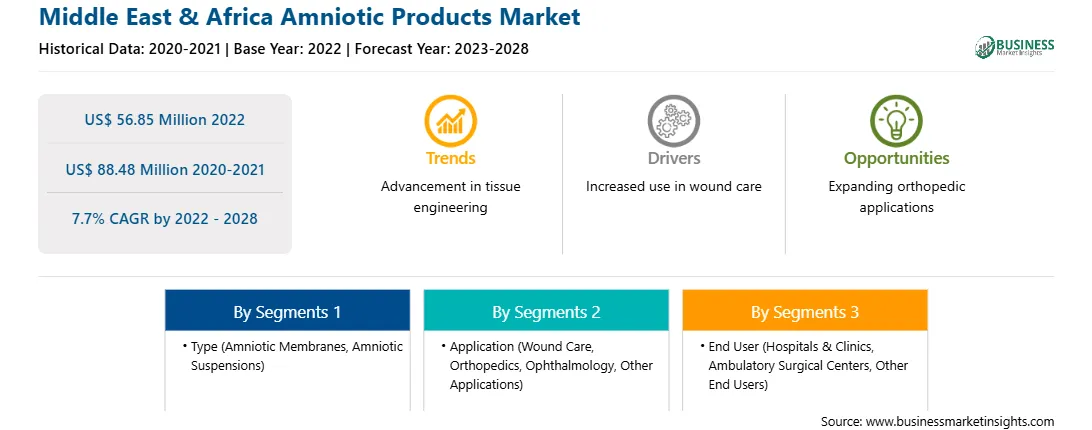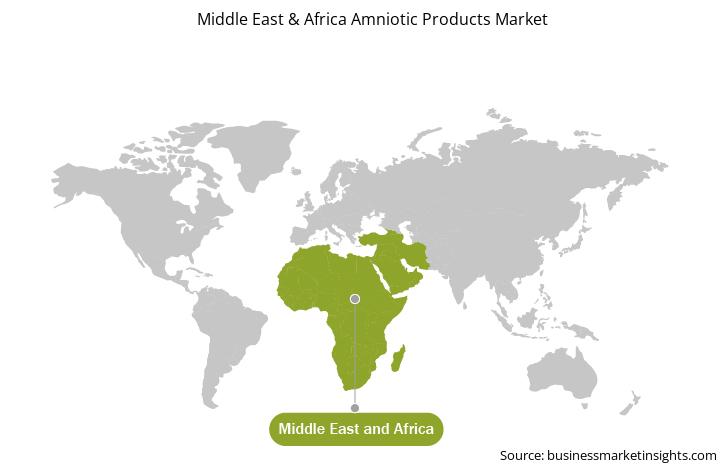The MEA amniotic products market is expected to grow from US$ 56.85 million in 2022 to US$ 88.48 million by 2028; it is estimated to grow at a CAGR of 7.7% from 2022 to 2028.
In December 2016, the 21st Century Cures Act was passed with the goal of advancing regenerative medicine research and medical innovation. The Act contains a number of provisions that could impact the development and approval of many products in the coming years. A new "Regenerative Medicine Advanced Therapy" classification and a fast-track approval procedure for innovative regenerative medicine products and therapies have been developed as a result of this Act. The 21st Century Cures Act was created to help speed up medication development and approval processes, allowing for rapid and efficient delivery of new medical advancements to patients. The application of these requirements is expected to improve interoperability and facilitate electronic health information access, exchange, and use. Therefore, the rise in funding allocation to surgery in low and middle-income countries would offer significant opportunities for the amniotic products market during the forecast period.
With the new features and technologies, vendors can attract new customers and expand their footprints in emerging markets. This factor is likely to drive the MEA amniotic products market. The MEA amniotic products market is expected to grow at a good CAGR during the forecast period.
Strategic insights for the Middle East & Africa Amniotic Products provides data-driven analysis of the industry landscape, including current trends, key players, and regional nuances. These insights offer actionable recommendations, enabling readers to differentiate themselves from competitors by identifying untapped segments or developing unique value propositions. Leveraging data analytics, these insights help industry players anticipate the market shifts, whether investors, manufacturers, or other stakeholders. A future-oriented perspective is essential, helping stakeholders anticipate market shifts and position themselves for long-term success in this dynamic region. Ultimately, effective strategic insights empower readers to make informed decisions that drive profitability and achieve their business objectives within the market.

| Report Attribute | Details |
|---|---|
| Market size in 2022 | US$ 56.85 Million |
| Market Size by 2028 | US$ 88.48 Million |
| Global CAGR (2022 - 2028) | 7.7% |
| Historical Data | 2020-2021 |
| Forecast period | 2023-2028 |
| Segments Covered |
By Type
|
| Regions and Countries Covered | Middle East and Africa
|
| Market leaders and key company profiles |
The geographic scope of the Middle East & Africa Amniotic Products refers to the specific areas in which a business operates and competes. Understanding local distinctions, such as diverse consumer preferences (e.g., demand for specific plug types or battery backup durations), varying economic conditions, and regulatory environments, is crucial for tailoring strategies to specific markets. Businesses can expand their reach by identifying underserved areas or adapting their offerings to meet local demands. A clear market focus allows for more effective resource allocation, targeted marketing campaigns, and better positioning against local competitors, ultimately driving growth in those targeted areas.

MEA Amniotic Products Market Segmentation
The MEA amniotic products market is bifurcated based on type, application, end user and country. Based on type, the market is segmented into amniotic membranes, and amniotic suspensions. The amniotic membranes segment dominated the market in 2022 and is expected to be fastest growing during forecast period. Based on application, the market is segmented into wound care, orthopedics, ophthalmology, and other applications. The wound care segment dominated the market in 2022 and orthopedics segment is expected to be fastest growing during forecast period. Based on end user, the market is segmented into hospitals and clinics, ambulatory surgical centers, and other end users. The hospitals and clinics segment dominated the market in 2022 and ambulatory surgical centers segment is expected to be fastest growing during forecast period. Based on country, the MEA amniotic products market is segmented into Saudi Arabia, South Africa, the UAE, and Rest of MEA.
Integra LifeSciences; Katena Products. Inc.; MiMedx; Next Biosciences; Organogenesis, Inc.; Sanuwave and Sanuwave Health, Inc.; Smith & Nephew; and Stryker are among the leading companies in the MEA amniotic products market.
The Middle East & Africa Amniotic Products Market is valued at US$ 56.85 Million in 2022, it is projected to reach US$ 88.48 Million by 2028.
As per our report Middle East & Africa Amniotic Products Market, the market size is valued at US$ 56.85 Million in 2022, projecting it to reach US$ 88.48 Million by 2028. This translates to a CAGR of approximately 7.7% during the forecast period.
The Middle East & Africa Amniotic Products Market report typically cover these key segments-
The historic period, base year, and forecast period can vary slightly depending on the specific market research report. However, for the Middle East & Africa Amniotic Products Market report:
The Middle East & Africa Amniotic Products Market is populated by several key players, each contributing to its growth and innovation. Some of the major players include:
The Middle East & Africa Amniotic Products Market report is valuable for diverse stakeholders, including:
Essentially, anyone involved in or considering involvement in the Middle East & Africa Amniotic Products Market value chain can benefit from the information contained in a comprehensive market report.